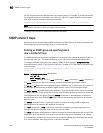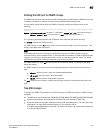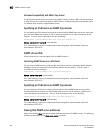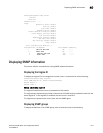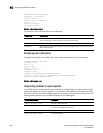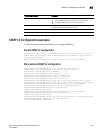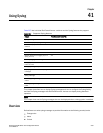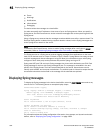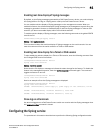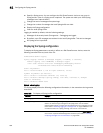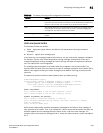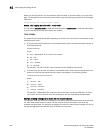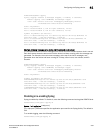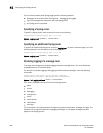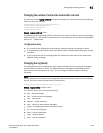
1382 PowerConnect B-Series FCX Configuration Guide
53-1002266-01
Displaying Syslog messages
41
• Errors
• Warnings
• Notifications
• Informational
• Debugging
The device writes the messages to a local buffer.
You also can specify the IP address or host name of up to six Syslog servers. When you specify a
Syslog server, the Dell PowerConnect device writes the messages both to the system log and to the
Syslog server.
Using a Syslog server ensures that the messages remain available even after a system reload. The
Dell local Syslog buffer is cleared during a system reload or reboot, but the Syslog messages sent
to the Syslog server remain on the server.
NOTE
To enable the Dell PowerConnect device to retain Syslog messages after a soft reboot (reload
command). Refer to “Retaining Syslog messages after a soft reboot” on page 1391.
The Syslog service on a Syslog server receives logging messages from applications on the local
host or from devices such as a Layer 2 Switch or Layer 3 Switch. Syslog adds a time stamp to each
received message and directs messages to a log file. Most Unix workstations come with Syslog
configured. Some third party vendor products also provide Syslog running on NT.
Syslog uses UDP port 514 and each Syslog message thus is sent with destination port 514. Each
Syslog message is one line with Syslog message format. The message is embedded in the text
portion of the Syslog format. There are several subfields in the format. Keywords are used to
identify each subfield, and commas are delimiters. The subfield order is insensitive except that the
text subfield should be the last field in the message. All the subfields are optional.
Displaying Syslog messages
To display the Syslog messages in the device local buffer, enter the show logging command at any
level of the CLI. The following shows an example display output.
PowerConnect>#show logging
Syslog logging: enabled (0 messages dropped, 0 flushes, 0 overruns)
Buffer logging: level ACDMEINW, 3 messages logged
level code: A=alert C=critical D=debugging M=emergency E=error
I=informational N=notification W=warning
Static Log Buffer:
Dec 15 19:04:14:A:Fan 1, fan on right connector, failed
Dynamic Log Buffer (50 entries):
Dec 15 18:46:17:I:Interface ethernet 4, state up
Dec 15 18:45:21:I:Bridge topology change, vlan 4095, interface 4, changed
state to forwarding
Dec 15 18:45:15:I:Warm start
For information about the Syslog configuration information, time stamps, and dynamic and static
buffers, refer to “Displaying the Syslog configuration” on page 1384.



